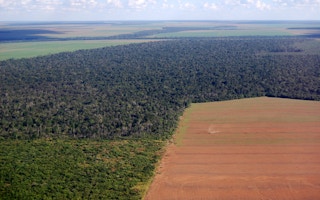Many of the world’s largest companies may have pledged to remove deforestation from their supply chains, but most of them are lagging on delivering these promises, a new study has found.
To continue reading, subscribe to Eco‑Business.
There's something for everyone. We offer a range of subscription plans.
- Access our stories and receive our Insights Weekly newsletter with the free EB Member plan.
- Unlock unlimited access to our content and archive with EB Circle.
- Publish your content with EB Premium.
Sustainability non-profit CDP, formerly known as the Carbon Disclosure Project, on Sunday released a report titled ‘Realising zero-deforestation: Transforming supply chains for the future’, showing a significant gap between company’s promises to protect forests and their ability to achieve a supply chain which is truly sustinable.
Katie McCoy, head of CDP’s forest programme told Eco-Business that companies wanting to implement their zero-deforestation commitments have to engage everyone in their supply chain to operate sustainably too.
“There’s no way they are going to get there without transforming their supply chain”, she added.
CDP’s programme helps investors understand how firms address the impact of deforestation on their business.
Launched at the Global Landscapes Forum, held on the sidelines of the UN climate change conference in Paris, the report is based on survey responses from 171 of the world’s largest companies.
The questionnaire, administered by CDP on behalf of 298 investors with US$19 trillion in assets, asked these businesses how they manage their cattle products, palm oil, timber, and soy supply chains. These four commodities are ubiquitous in daily life but are widely linked to deforestation.
Jonas Kron, director of shareholder advocacy at US-based Trillium Asset Management, noted in a statement that investors want to know what companies are doing about the risk that deforestation poses to their business.
“This is particularly true when we talk about agriculture,” he added. “It’s about the impact we have on climate change, and the impact that climate change has on supply chains”.
The negative impacts of climate change and deforestation on companies include disputes with communities over land use, damage to a company’s brand and reputation, and difficulty in securing financing as banks stop deforestation-linked lending.
About 70 per cent of companies surveyed recognise these risks, and have committed to address deforestation in their supply chain. These include food giants McDonald’s and Mars, palm oil firms First Resources Limited and Wilmar International and paper firms such as Asia Pulp and paper, among others.
“
Protecting our forests is one of the best things we can do to prevent dangerous global warming.
Katie McCoy, head of forests, CDP
However, half of the companies which have promised to buy sustainable soy have yet to get any into their supply chains, the report found. For palm oil, this figure stands at 26 per cent.
CDP also found that 77 per cent of the manufacturers and retailers surveyed had sustainable sourcing standards for forest commodities, but a majority 76 per cent of them did not provide training to suppliers on how to avoid deforestation-linked products.
Five steps forward
To address these shortcomings, the report suggested five ways in which companies can work with suppliers to produce more deforestation-free products:
- Enhance the procurement process: Buyers need to set clear requirements, certifications requirements, and traceability rules for suppliers. They also need to train their procurement teams on how to integrate these rules into their sourcing.
- Communicate expectations: Companies need to do more to show suppliers that deforestation-free practices can yield benefits such as increased productivity, improved product quality, and higher income. Firms should achieve this by holding workshops for their suppliers, and communicate such messages to the wider sector. Joining industry associations for sustainability - such as the Roundtable for Sustainable Palm Oil- is a good avenue for this.
- Track progress transparently: Corporations must track their progress on sustainability goals, and make these reports available to the public. This data needs to be verified by external auditors.
- Collaborate to drive progress: Companies need to collaborate with suppliers. Both parties can jointly agree on targets and work plans, and big firms can even help smaller suppliers seek sustainability certification. Buyers must also work with policymakers and other stakeholders such as environmental groups to address broader challenges around deforestation.
- Review, revisit, reward: Companies must conduct regular reviews of supplier performance, act swiftly against suppliers that violate their policies, and reward those which comply with them.
One firm which was showcased in the report for its efforts to engage suppliers on zero-deforestation is Indonesian pulp and paper giant Asia Pulp and Paper (APP).
Speaking at the report’s launch, Aida Greenbury, managing director of sustainability, APP, shared that the company has had a zero-deforestation policy in place since 2013, and has dedicated resources to engaging and training suppliers to abide by this.
When the company started this initiative, there was no business model or guarantee that this investment would pay off, said Greenbury.
“But we just had to believe in our values,” she said, adding that the investment ultimately paid off and APP’s market access has expanded in the past three years.
CDP’s McCoy urged more companies to proactively engage their suppliers on deforestation, noting that “protecting our forests is one of the best things we can do to prevent dangerous global warming”.
While policymakers work at the UN climate change conference in Paris work out an agreement to reduce greenhouse gases, companies must also do their part, she added.
“The long-term viability of agricultural production, food security, and climate action depend on this”.












